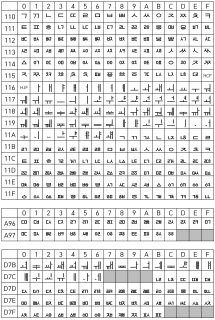Related Research Articles
Unicode has subscripted and superscripted versions of a number of characters including a full set of Arabic numerals. These characters allow any polynomial, chemical and certain other equations to be represented in plain text without using any form of markup like HTML or TeX.
As of Unicode version 14.0 Cyrillic script is encoded across several blocks:
Geometric Shapes is a Unicode block of 96 symbols at code point range U+25A0–25FF.
Phonetic Extensions is a Unicode block containing phonetic characters used in the Uralic Phonetic Alphabet, Old Irish phonetic notation, the Oxford English dictionary and American dictionaries, and Americanist and Russianist phonetic notations. Its character set is continued in the following Unicode block, Phonetic Extensions Supplement.
Latin Extended-D is a Unicode block containing Latin characters for phonetic, Mayanist, and Medieval transcription and notation systems. 89 of the characters in this block are for medieval characters proposed by the Medieval Unicode Font Initiative, many of which are representative of scribal abbreviations used in Medieval manuscript texts.
Combining Half Marks is a Unicode block containing diacritical combining characters for spanning multiple characters.
Latin Extended-A is a Unicode block and is the third block of the Unicode standard. It encodes Latin letters from the Latin ISO character sets other than Latin-1 and also legacy characters from the ISO 6937 standard.
Latin Extended-B is the fourth block (0180-024F) of the Unicode Standard. It has been included since version 1.0, where it was only allocated to the code points 0180-01FF and contained 113 characters. During unification with ISO 10646 for version 1.1, the block range was extended by 80 code points and another 35 characters were assigned. In version 3.0 and later, the last 60 available code points in the block were assigned. Its block name in Unicode 1.0 was Extended Latin.
Cyrillic Extended-B is a Unicode block containing Cyrillic characters for writing Old Cyrillic and Old Abkhazian, and combining numeric signs.
Cyrillic Supplement is a Unicode block containing Cyrillic letters for writing several minority languages, including Abkhaz, Kurdish, Komi, Mordvin, Aleut, Azerbaijani, and Jakovlev's Chuvash orthography.
Latin Extended Additional is a Unicode block.
Cyrillic is a Unicode block containing the characters used to write the most widely used languages with a Cyrillic orthography. The core of the block is based on the ISO 8859-5 standard, with additions for minority languages and historic orthographies.

Hangul Jamo is a Unicode block containing positional forms of the Hangul consonant and vowel clusters. They can be used to dynamically compose syllables that are not available as precomposed Hangul syllables in Unicode, specifically syllables that are not used in standard modern Korean.

Hangul Jamo Extended-B is a Unicode block containing positional forms of archaic Hangul vowel and consonant clusters. They can be used to dynamically compose syllables that are not available as precomposed Hangul syllables in Unicode, specifically syllables that are not used in standard modern Korean.
Hiragana is a Unicode block containing hiragana characters for the Japanese language.
Katakana is a Unicode block containing katakana characters for the Japanese and Ainu languages.
Devanagari Extended is a Unicode block containing cantilation marks for writing the Samaveda, and nasalization marks for the Devanagari script.
Kana Supplement is a Unicode block containing one archaic katakana character and 255 hentaigana characters. Additional hentaigana characters are encoded in the Kana Extended-A block.
Glagolitic is a Unicode block containing the characters invented by Saint Cyril for translating scripture into Slavonic. Glagolitic script is the precursor of Cyrillic.
Cyrillic Extended-C is a Unicode block containing Cyrillic characters for facsimile reprinting Old Believer service books. They are graphic variants of standard Cyrillic rather than distinct letters.
References
- ↑ "Unicode character database". The Unicode Standard. Retrieved 2016-07-09.
- ↑ "Enumerated Versions of The Unicode Standard". The Unicode Standard. Retrieved 2016-07-09.